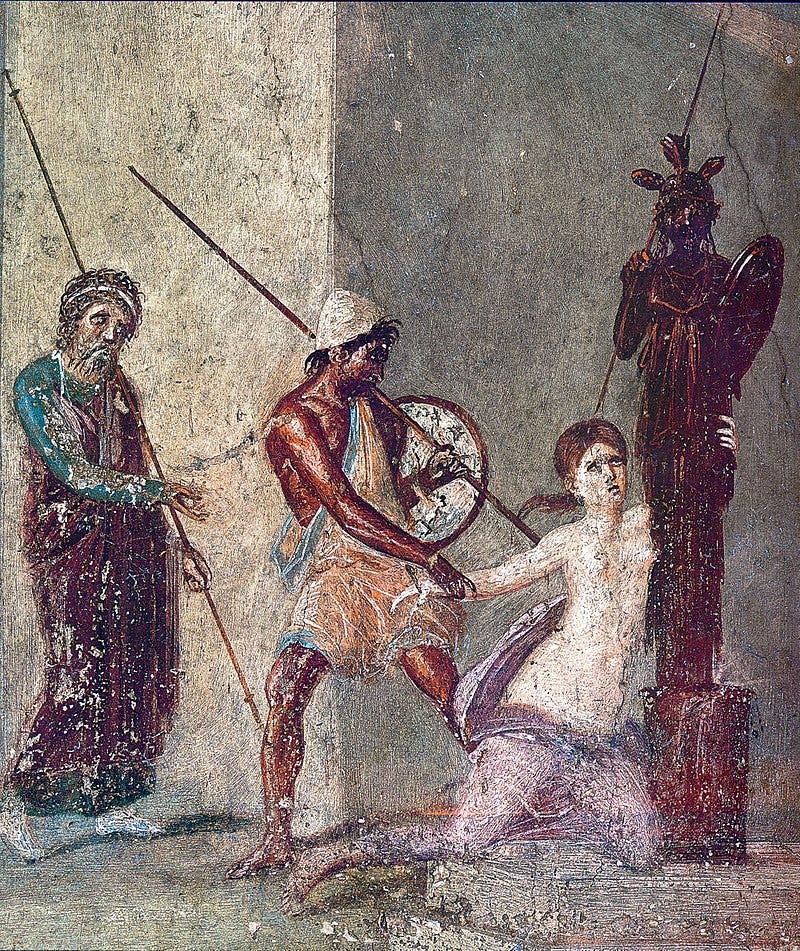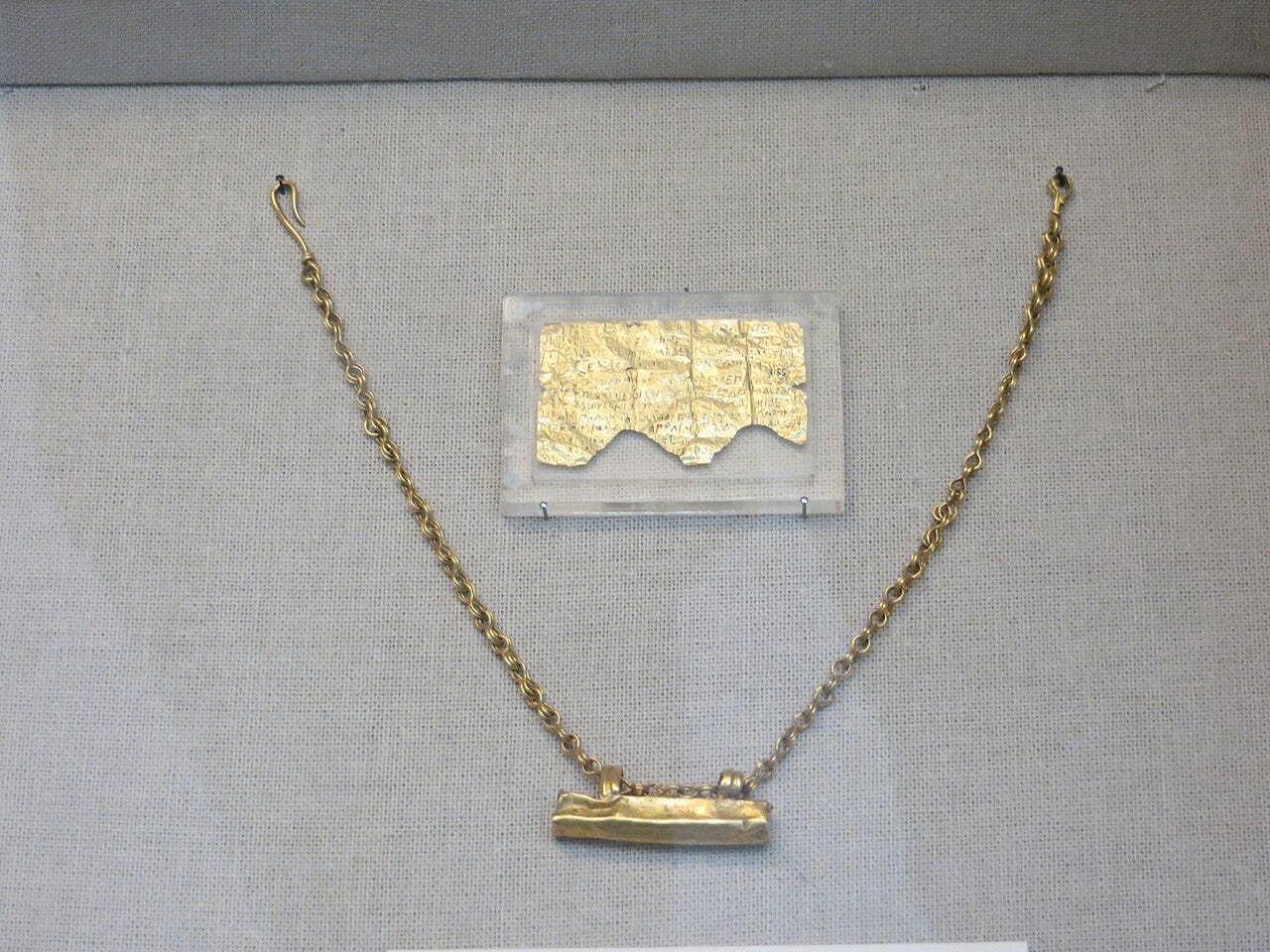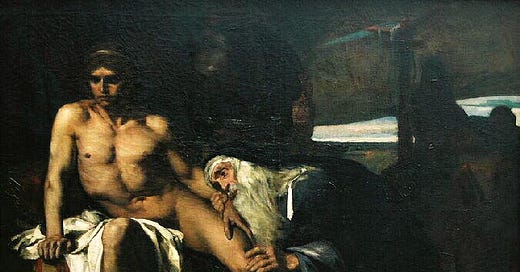This is one of a few posts dedicated to Iliad 24. As a reminder, these posts will remain free, but there is an option to be a financial supporter. All proceeds from the substack are donated to classics adjacent non-profits on a monthly basis.
After the gods have decided to force Achilles to return Hektor’s body, Thetis is dispatched to talk to her son and Iris tells Priam to go with a ransom to Achilles. Priam meets resistance from his family, but eventually he begins his journey across the plains of war.
Homer, Iliad 24. 322-333
“The old man climbed quickly into his chariot
And drove through the foregate and the resonating passage,
The miles drove the four-wheeled cart
And wise Idaios guided them in turn. Then the horses
Were coming from behind. The old man was striking them with a goad
Moving them quickly through the city. All of his loved ones
Were following him. Mourning as if he were going to his death.
Then they descended down from the city and came to the meadow.
But they family members turn back again and arrived in the city,
The sons and sons-in-law, and the two of them [Idaios and Priam]
Did not escape the notice of wide-browed Zeus as they entered the plain.
He saw them and felt pity. Quickly he turned to his dear son Hermes
And addressed him:Σπερχόμενος δ’ ὃ γεραιὸς ἑοῦ ἐπεβήσετο δίφρου,
ἐκ δ’ ἔλασε προθύροιο καὶ αἰθούσης ἐριδούπου.
πρόσθε μὲν ἡμίονοι ἕλκον τετράκυκλον ἀπήνην,
τὰς ᾿Ιδαῖος ἔλαυνε δαΐφρων· αὐτὰρ ὄπισθεν
ἵπποι, τοὺς ὃ γέρων ἐφέπων μάστιγι κέλευε
καρπαλίμως κατὰ ἄστυ· φίλοι δ’ ἅμα πάντες ἕποντο
πόλλ’ ὀλοφυρόμενοι ὡς εἰ θάνατον δὲ κιόντα.
οἳ δ’ ἐπεὶ οὖν πόλιος κατέβαν, πεδίον δ’ ἀφίκοντο,
οἳ μὲν ἄρ’ ἄψορροι προτὶ ῎Ιλιον ἀπονέοντο
παῖδες καὶ γαμβροί, τὼ δ’ οὐ λάθον εὐρύοπα Ζῆν
ἐς πεδίον προφανέντε· ἰδὼν δ’ ἐλέησε γέροντα,
αἶψα δ’ ἄρ’ ῾Ερμείαν υἱὸν φίλον ἀντίον ηὔδα·
This speech is filled with the language of burial and death. One could almost imagine that when Priam’s sons and sons-in-law accompany him out of the city, they are engaging in a funerary procession, taking Priam himself to his final resting place. Even more, the language evokes heroic journeys: when the narrative says “they went down from the city”, it uses the word kateban (κατέβαν), about as close as possible to katabasis, a term for a trip “down-country”, or to the underworld.

The middle section of book 24 is the movement from the city to the sea, from the confines of besieged Troy to the marginalized outpost of Achilles’ dwelling where Hektor’s mistreated body lies preserved by divine intervention. The length of this episode has multiple motivations with structural, dramatic, and symbolic forces. Structurally, the passage corresponds to the embassy to Chryses in book 1, building on that in a kind of doublet that expands to place greater emphasis on the subsequent scene.
As a feature of narrative structure, the movement through the space creates a kind of ‘real time’ delay, postponing the highly anticipated confrontation with suspense but also putting the audience through something of a transformative passage. Priam’s movement from the city to Achilles in the dead of night is dangerous: the atmosphere of the scene brings the audience along on that trip, narrowing in nearly on each step that it takes to bring these two together. The role-playing of Hermes as one of Achilles’ ‘henchmen’ provides another moment to think about divine and mortal double motivation: from one perspective we could tell the story without a god at all, imagining the scene from Priam’s point of view as an odd intersection between luck and desperation.
From the opposite perspective, this changes the way gods engage with men: Hermes and Apollo are brothers with complementary aspects (negotiated humorously in the Homeric Hymn to Hermes). They appear together in the Odyssey during Demodokos’ song of Ares and Aphrodite, audience members laughing at their humiliation. In this epic, Hermes has been mostly absent, but I suspect there are ritual/religious echoes in the change from book 1 where Apollo begins as a righteous god of rage, punishing the Greeks, to book 24 where he argues for the right of all humans to a burial and then is followed by Hermes’ intervention to help ensure that one particular human is buried. (Indeed, Malcolm Davies has seen a transformation in Hermes during the epic, see Davies 2020)
This is where we get into the symbolic too. It is significant in many ways that Hermes is the god selected to lead Priam to Achilles. Hermes is a god of the threshold, a divinity who represents the movement between different realms. He is in nearly every aspect a liminal god, one who has influence over the passage between different states and who can occupy the space between them. In this capacity, Hermes can ‘trigger’ some critical associations. As the psychopompos, “the marshal of the dead”, Hermes is the deity who leads souls from the realm of the living to Hades. In book 24 then, his appearance reinforces that Achilles is still in the realm of the dead: when he leads Priam from the city to the sea, he is taking him to a liminal place between worlds. Achilles is between the land and the sea, between the living and the dead, and between mortals and gods. It is almost as if the two ‘opposites’—the old and the young, the aggressor and the defender, the father and the son—can only meet in a place between worlds. And this betweenness is transitional. Through their pairing they move from an opposing to a binary pair, two men united in the certainty of their coming deaths and the pain of their losses.
Hermes’ intervention confirms that Priam and Achilles can only meet in an otherworldly place and confirms, on many different levels, the exceptional nature of the epic’s penultimate scene. Ancient audiences would have sensed much of this, but there is a good chance we modern audiences miss even more. As a friend of mine, Miguel Herrero de Jáuregui shows, this scene engages with a tradition of “katabasis”, the mythological motif of entering the underworld to complete some heroic tasks. Earlier authors (e.g. Robert 1950) imagined some version of the story where Priam goes to save his son from death. This line of thinking brings Homer together with stories of Orpheus.

Orphism in the ancient world denotes a likely loosely associated set of practices and beliefs about death and rebirth, named for the mythical singer Orpheus. We have many fragments and texts from orphic practices in antiquity, but they have traditionally not been paired with so-called literary texts like epic, as if ancient audiences possessed some kind of cognitive ‘firewall’ between the stories of heroes and gods and the stories of….heroes and gods? But it is pretty clear that there is significant resonance between the language and traditions of orphism and key scenes in Homeric epic.
As Miguel notes, book 24 is replete with the language and motifs of a journey to the world of the dead, shared not just with Greek religion and myth, but with Near Eastern motifs as well. (Think of aspects of the tales of Odysseus in Odyssey 11, Heracles in his labors, or the journey of Gilgamesh after the death of Enkidu.) Priam enters the world of the dead at 24.349-353 and exits it again later (692-95). Miguel even argues that Achilles’ home is “clearly constructed on the model of the house of hades” (46):
“This helps explain why Achilles' tent or hut (448:) in a soldier s camp is nevertheless described as a large dwelling-place, with roof, courtyard, and bolted gates (448-56). These gates, we are told, only Achilles can open by himself (456), which recalls the description of Hades as "fastener of the gate";, precisely in the context of Heracles' catabasis: 8.367).28 This transformation of a warrior s hut into a megaron complex is best explained by the association with the House of the King of the Underworld.”
The Iliad’s Achilles is something of a god of death—he deals it out from the beginning of the poem and like Hades himself has distributed pain without prejudice, ending the lives of his near and dear as much as those of his enemies. He ends up “figuratively playing Hades’ role at the end” of the epic (Herrero de Jáuregui 2011, 48) creating a potentially ironic intertext with the Achilles of the Odyssey who wishes to be a farmhand rather than prince of the dead. As king of the dead, though, Achilles receives a ransom that echoes rites in myth and reflected in the Orphic tablets, the supplication of Hades and Persephone for the soul of the dead. The process of the laying out of Hektor’s corpse followed by his transport back to his home may echo burial practices of the prosthesis (“laying out”) and the funerary procession (“ekphora”) as well.
Miguel also notes the overlap between narratives of katabasis and rituals connected with death. The domains are interconnected and co-influencing, but not in a fixed way. Even as Iliad 24 draws on narrative and ritual traditions concerning the transition from the world of the living to the dead, it also changes these traditions and becomes yet another cultural intertext for thinking about them. In a way, this recreation of a traditional story through Priam is a follow-up to Apollo’s declaration of Hektor’s rite to burial and even Hera’s insistence in book 16 (when speaking of Sarpedon) that funeral rites are the geras (prize of honor) of the dead.
The whole framework of book 24 is to ensure that Hektor receives this prize, which closes the theme of honors opened in book 1 when Achilles was deprived of his own prize. The performance of time and the echoes of an underworld journey serve in part to create a geras equal to Hektor’s status and Priam’s emotional loss. By making Achilles the agent who delivers on this obligation, the social-cosmic rupture of book 1 is closed. It is not enough for Achilles to repair his own honor, he must be in a position to guarantee that someone else’s geras is returned, even in death.
Short bibliography on the Book 24
n.b this is not an exhaustive bibliography. If you’d like anything else included, please let me know.
Bernabe, A. and Jimenez, A. 2008. Instructions for the Netherworld: The Orphic Gold Tablets. Trans, by M. Chase. Leiden: Brill
Malcolm Davies, ‘From night to night: Apollo, Artemis and Hermes in Homer’, in Ο επάνω και ο κάτω κόσμος στο ομηρικό και αρχαϊκό έπος: από τα πρακτικά του ΙΓ’ Διεθνούς Συνεδρίου για την « Οδύσσεια » : Ιθάκη, 25-29 Αυγούστου 2017, ed. by Menelaos Christopoulos and Machi Païzi-Apostolopoulou (Ithaki: Kentro Odysseiakon Spoudon, 2020), pp. 383-392.
Herrero de Jáuregui, Miguel. “Priam's catabasis: traces of the epic journey to Hades in Iliad 24.” TAPA, vol. 141, no. 1, 2011, pp. 37-68. Doi: 10.1353/apa.2011.0005
De Jong, Irene J. F.. “Homerische verteltechniek : de ontmoeting tussen Hermes en Priamus in Ilias 24.” Lampas, vol. XXIII, 1990, pp. 370-383.
Hooker, J. T. 1988 "The Cults of Achilles." RhM 131:
Mayhew, Robert. “Aristotle on Hermes’ sandals in Schol. T Iliad 24.340: a neglected « fragment » ?.” Classical Quarterly, N. S., vol. 66, no. 2, 2016, pp. 777-780. Doi: 10.1017/S0009838816000628\
Most, G. W. 1992. "II poeta nell'Ade: catabasi epica e teoria dell'epos tra Omero e Virgilio." SIFC 10: 1014-26.
Nagy, G. 1979. The Best of the Achaeans: Concepts of the Hero in Archaic Greek Poetry. Baltimore: Johns Hopkins University
Poulheria Kyriakou, ‘Reciprocity and gifts in the encounters of Diomedes with Glaucus and Achilles with Priam in the « Iliad »’, Hermes, 150.2 (2022) 131-149. Doi: 10.25162/hermes-2022-0009
Robert, E 1950. Homere. Paris: Presses Universitaires de France
Segal, C. 1971. The Theme of the Mutilation of the Corpse in the Iliad. Leiden:
Shiffman, Gary Adam. “« Going alone » at Iliad 24. 198-205.” Classical Quarterly, vol. XLII, 1992, pp. 269-270. Doi: 10.1017/S0009838800042750
Sourvinou-Inwood, C. 1981. "To Die and to Enter the House of Hades: Homer, Before and After." In Whaley, J. ed. Mirrors of Mortality. London: Europa
Wathelet, P. 1988. "Priam aux Enfers ou le retour du corps d'Hector." LEC
West, Stephanie. “Priam's cup: a note on Iliad 24.429-36.” Acta Antiqua Academiae Scientiarum Hungaricae, vol. 40, no. 1-4, 2000, pp. 489-494. Doi: 10.1556/AAnt.40.2000.1-4.45




